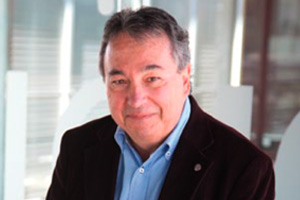“In the Institute of Chemical Research of Catalonia we are especially committed to the educational community”

Interview with MIQUEL A. PERICÀS
Director of the Institute of Chemical Research of Catalonia
“The Severo Ochoa Award will let us develop a strategic project in the field of catalysis”
The Institute of Chemical Research of Catalonia (ICIQ) was created in the year 2000 under the auspices of the Autonomous Government of Catalonia (Generalitat), although its research programme began in 2004. It is situated in Tarragona, on the Campus of Sescelades, and has 230 employees. The three main research lines of the eighteen research groups in the Institute are: catalysis, supermolecular chemistry, and renewable energies. During its existence, the centre has developed research of excellence and supports industry by transferring its results to companies.
Its Director, Miquel A. Pericàs, took part in the biggest meeting of Spanish centres of excellence with journalists and popularizers of science, the “100XCIENCIA” forum, which was celebrated on the island of La Palma between 7th and 9th October. Asked about what the Severo Ochoa award has meant for his centre he replied that “The award will allow us to develop a strategic project in the field of catalysis. The project is directed at the discovery of catalysts for the generation of fuel (hydrogen) by splitting water into its components, oxygen and hydrogen, using solar energy, and the discovery of catalysts for the conversion of molecules with a strong environmental impact (such as CO2) or those with a low level of reactivity (such as methane) into molecules of interest for the chemical and energy industries”.
This award of excellence “will also allow us to consolidate our Starting Career Programme to help young researchers with a great future to start an independent research career and we will be able to put in place a programme of international mobility to doctoral students” says the Director, and adds that “It also gives us the opportunity to develop a programme of training for postdoctoral researchers”.
For the ICIQ all of this has meant, without a doubt, an effort to become international. “We have signed agreements with universities and research centres (Michigan, ETH Zurich, Max-Planck Institute für Kohlenforschung, among others) for the training of doctoral students and postdocs and we have also increased our scientific collaboration with international research groups”.
As for the present and future challenges “Our day to day challenge is to carry out excellent research. But to do that it is not only necessary to have outstanding researchers, but it is essential to count on adequate funding. In the ICIQ we are developing a strategy to obtain resources which is working well. We have won significant European funding (we have 10 projects from the European Research Council) private donations (mainly from the CELLEX foundation), and many contracts and projects in collaboration with industry. And, of course, we have had the support of the Ministry in the form of the Severo Ochoa award. At the present time we can say that half of our funding comes from outside, competitive sources. The rest comes directly from the Regional Government of Catalonia”.
They have set, as an objective “maintaining the upward trend in winning external funding, and by so doing broaden our lines of research and guarantee the resources of our scientists, the equipment and administrative support needed to maintain our level of excellence. This is the basis on which to be able to contribute to the competitiveness of the chemical and pharmaceutical industries, and to tackle successfully challenges such as improving the environment, health, and the development of new sources of more sustainable energy, and summarizing, to improve the quality of life of our citizens”.
The Institute of Chemical Research of Catalonia sets great store by science popularization and, above all, outreach aimed at education. “We are especially committed to collaborate with the educational community, to train teachers so that they can teach new subjects and find new ways to explain chemistry, and to teach secondary school students via workshops, courses, and advising them on research projects. We think that it is very important that young people find chemistry exciting, central within most scientific disciplines and a key to social progress, in health (medicines), energy (renewable energies) and the environment (cleaner processes of production). In the future we will keep working along these lines, but with the aim of setting up programmes to encourage scientific vocations, in collaboration with other universities and with companies both nationally and internationally”.
Coordination of interviews: Verónica Martín




